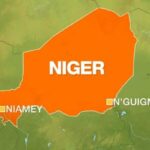The International Monetary Fund (IMF) has said the sustained closure of the Nigerian land borders is hurting economies of Benin Republic and Niger Republic.
Abebe Aemro Selassie, Director, African Department (IMF) stated this at a press briefing during the launch of Economic outlook for sub-Saharan Africa at the ongoing World Bank/IMF annual meetings in Washington DC.
“On the border closure in Nigeria which has been impacting Benin and Niger, our understanding is that the border has been closed, reflecting concerns about smuggling that’s been taking place, illegal trade, not the legal trade that you want to facilitate” he sisd.
IMF is also optimistic the borders would soon open. “So we’re very hopeful that, you know, discussions will resolve the challenges that this illegal trade is fostering” he said.
The IMF also said sub-Saharan Africa will experience modest growth.
“Growth in Sub-Saharan Africa is expected to pick up, though at a slower rate than previously envisioned. For this year we are projecting growth at around the 3.2 percent mark, rising to 3.6 percent in 2020′ he said. “Relative to April, we have seen growth revised down for about two-thirds of countries this year, albeit by a modest’ he noted.
On fighting poverty in Nigeria, the IMF director said “you have in part of the country very elevated levels of poverty; very elevated levels of, you know, infant mortality, maternal mortality — really important indicators of wellbeing — really are very high in some parts of the country; and in other parts of the country are, you know, comparatively very low. So, there’s this big variation in poverty outcomes, economic outcomes, as you know in your country” he said.
“So, I think a really important focus, of course, is, you know, to try and identify those areas where these outcomes are really weak and, perhaps, region specific, intervention are going to be needed — that’s one thought. And the other one, of course, is just getting — I agree that’s growth, you know, overall growth in the country as a whole to be much higher than it is at the moment,” he explained.

 Join Daily Trust WhatsApp Community For Quick Access To News and Happenings Around You.
Join Daily Trust WhatsApp Community For Quick Access To News and Happenings Around You.


